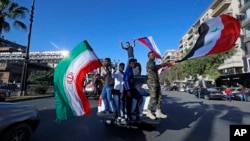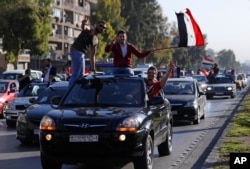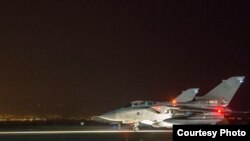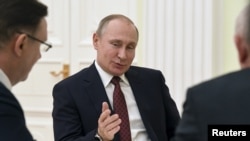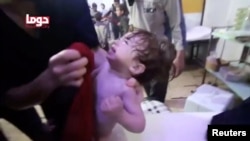Hundreds of Syrians gathered at landmark squares in the Syrian capital Saturday, honking their car horns, flashing victory signs and waving Syrian flags in scenes of defiance that followed unprecedented joint airstrikes by the United States, France and Britain.
A few hours earlier, before sunrise, loud explosions jolted Damascus and the sky turned orange as Syrian air defense units fired surface-to-air missiles in response to three waves of military strikes meant to punish President Bashar Assad for his alleged use of chemical weapons.
Associated Press reporters saw smoke rising from east Damascus and what appeared to be a fire light up the sky. From a distance, U.S. missiles hitting suburbs of the capital sounded like thunder. Shortly after the one-hour attack ended, vehicles with loudspeakers roamed the streets of Damascus blaring nationalist songs.
“Good souls will not be humiliated,” Syria’s presidency tweeted after the airstrikes began.
Syrians celebrate
Immediately after the attack, hundreds of residents began gathering in Omayyad square of the Syrian capital, celebrating what they said was the army’s success in shooting down or derailing some of the missiles. Many waved Syrian, Russian and Iranian flags. Some clapped their hands and danced, other drove in convoys, honking their horns in defiance.
“We are your men, Bashar,” they shouted. Others shouted: “Oh Trump you are a monkey. Oh Trump you are an animal,” as they stood in the square decorated with a giant colored “I Love Damascus” sign. The taunts were a clear retort to Trump calling Assad an “animal” in tweets following the suspected chemical weapons attack.
Syria: few injuries, little damage
A Syrian military statement said in all, 110 missiles were fired by the U.S., Britain and France and that most of them were shot down or derailed.
The statement read by Brig. Gen. Ali Mayhoub said three civilians were wounded in one of the U.S.-led strikes on a military base in Homs, although the attack was aborted by derailing the incoming missile. He said another attack with “a number of missiles” targeting a scientific research center in Barzeh, near Damascus, destroyed a building and caused other material damage but no human losses. Mayhoub added the building in the research center included an educational center and labs.
The attack began at 4 a.m. in Damascus (0100 GMT) with missiles hitting the eastern suburbs of the capital. The sky looked orange over eastern Damascus apparently as a result of fires caused by the missiles hitting Syria. Air defense units fired surface-to-air missiles from different directions toward incoming missiles.
Syrian TV called the attacks a “blatant violation of international law and shows contempt for international legitimacy.”
U.S. Defense Secretary James Mattis said there were no reports of U.S. losses during the initial airstrikes.
“Right now this is a one-time shot,” he said but did not rule out further attacks. He said the airstrikes were launched against several sites that helped provide Assad’s ability to create chemical weapons.
France's assessment
France’s foreign minister said the “chemical escalation” in Syria is not acceptable because it’s violating the rules of war and of humanity. Jean-Yves Le Drian told reporters Saturday that the joint military operation in Syria is legitimate, limited and proportionate.
On Saturday, France’s government released its assessment of what happened in Douma on April 7. It said that while it has no samples of the chemical weapons it believes were used in Syria, it evaluated publicly available information from non-governmental organizations and other sources as well as unspecified French intelligence.
It concludes that there is “no plausible scenario other than that of an attack by Syrian armed forces.” The assessment notes eight chlorine attacks ahead of the Douma attack and 44 allegations of chemical weapons use in Syria over the past year.
British Prime Minister Theresa May described the attack as neither “about intervening in a civil war” nor “about regime change” but a limited and targeted strike that “does not further escalate tensions in the region” and does everything possible to prevent civilian casualties.
She cited reports she says indicate the Syrian government used a barrel bomb to deliver the chemicals used in an attack on Douma. Barrel bombs are large containers that are packed with fuel, explosives and scraps of metal.
May says the accounts suggest a Syrian government helicopter was seen flying above Douma just before last weekend's attack.
Britain’s defense ministry said that while the effectiveness of the strike is still being analyzed, “initial indications are that the precision of the Storm Shadow weapons and meticulous target planning have resulted in a successful attack.”
Iran, Russia condemn attack
The Iranian Foreign Ministry strongly condemned the U.S.-led airstrikes on Syria and warned of unspecified consequences.
Russian President Vladimir Putin has denounced a strike on Syria launched by the United States and its allies as an “act of aggression” that will exacerbate humanitarian catastrophe in Syria.
In a statement issued by the Kremlin, the Russian leader says Moscow is calling an emergency meeting of the United Nations' Security Council over the strike launched by the U.S., Britain and France.
Putin added that the strike had a “destructive influence on the entire system of international relations.”
He reaffirmed Russia's view that a purported chemical attack in Douma was a fake. Putin added that Russian military experts who inspected Douma found no trace of the attack. He criticized the U.S. and its allies for launching the strike without waiting for inspectors from the international chemical weapons watchdog to visit the area.
The allied operation comes a year after a U.S. missile strike that Trump said was meant to deter Assad from further use of chemical weapons. Since that did not work, a more intense attack would aim to degrade his ability to carry out further such attacks, and would try to do this by hitting Syrian aircraft, military depots and chemical facilities, among other things.
The one-off missile strike in April 2017 targeted the airfield from which the Syrian aircraft had launched their gas attack. But the damage was limited, and a defiant Assad returned to episodic use of chlorine and perhaps other chemicals.




